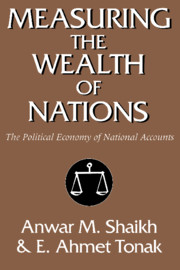Book contents
- Frontmatter
- Contents
- List of figures
- List of tables
- Preface
- 1 Introduction
- 2 Basic theoretical foundations
- 3 Marxian categories and national accounts: Money value flows
- 4 Marxian categories and national accounts: Labor value calculations
- 5 Empirical estimates of Marxian categories
- 6 A critical analysis of previous empirical studies
- 7 Summary and conclusions
- Appendices
- References
- Author index
- Subject index
6 - A critical analysis of previous empirical studies
Published online by Cambridge University Press: 09 February 2010
- Frontmatter
- Contents
- List of figures
- List of tables
- Preface
- 1 Introduction
- 2 Basic theoretical foundations
- 3 Marxian categories and national accounts: Money value flows
- 4 Marxian categories and national accounts: Labor value calculations
- 5 Empirical estimates of Marxian categories
- 6 A critical analysis of previous empirical studies
- 7 Summary and conclusions
- Appendices
- References
- Author index
- Subject index
Summary
The classical and Marxian traditions share the distinction between production and nonproduction labor. But Marx was particularly concerned with that portion of production labor which is productive of capital, since only this labor creates surplus value. The rest of labor is unproductive of capital, even though it may be wage labor (in distribution and state activities) or production labor (productive of value or of use value). Marx himself does not imply that productive labor is in any way superior to, or more necessary than, unproductive labor. But as we pointed out in Chapter 2, not all Marxists proceed in the same way. Most notably, Baran (1957, p. 32) redefines productive labor as labor that would be necessary under a “rationally ordered” (socialist) society. Marx's definition of productive labor is thereby replaced with a definition based on necessity, and the concept of surplus value is replaced with the concept of “surplus” – defined as the excess of the total product over essential personal and public consumption.
This chapter will analyze the various attempts to measure Marxian categories. In order to make the account manageable, we restrict ourselves to studies published in English, and to estimates of the rate of surplus value. Sharpe (1982a) covers some of the literature available in French, but a comprehensive worldwide survey remains to be done. The Japanese are pioneers in this regard.
- Type
- Chapter
- Information
- Measuring the Wealth of NationsThe Political Economy of National Accounts, pp. 152 - 209Publisher: Cambridge University PressPrint publication year: 1994



